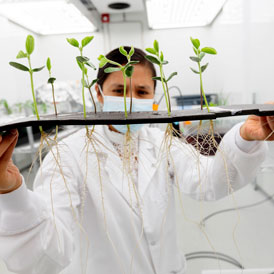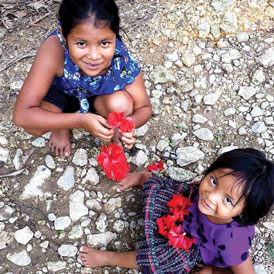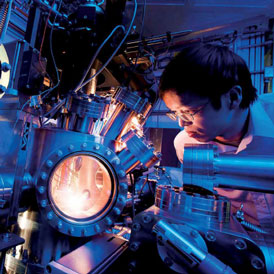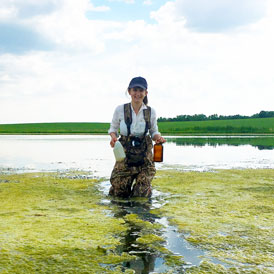CAMPAIGN PRIORITY
LEAD CRITICAL RESEARCH
Confront humanity's greatest challenges and opportunities through research and engagement with communities to find solutions.

Critical Research is the foundation for creative problem-solving, invention, and social and technological change. USask plays a vital role in nurturing, empowering, and unleashing the knowledge that will allow us to imagine a brighter, more sustainable future.
Attracting researchers in targeted areas where we excel allows us to provide fresh insights, change ways of thinking, and improve society.
Creation of research chairs and professorships fuels innovation and attracts global talent. Chairs and professorships in our greatest strength areas address Saskatchewan's critical challenges and in doing that, we serve the world.
DISCOVERY THE WORLD NEEDS
Courageous curiosity solves the issues of our communities and our world.
WITH YOUR SUPPORT
We can’t do this without the support of donors like you. Together, we will attract more global leaders, faster. Together, we will give students more opportunities to be involved in high-impact research, sooner. Together, we will undertake the research the world needs.
With your support we can:
- Increase the number of endowed Research Chairs
- Increase endowments to support Graduate Student Funding
- Provide undergraduate research experiences to more students every year
- Accelerate critical research projects and initiatives




UNIQUE USASK CENTRES
Breakthrough USask research has a proven track record in having long-term vision that provides discovery with huge impact. USask is a member of the U15 group of Canadian research-intensive medical doctoral universities.
The Canadian Centre for the Study of Co-operatives (CCSC) is a dynamic interdisciplinary research and teaching centre exploring the transformative potential of co-operatives in addressing a wide range of social, economic, and environmental challenges.
Dedicated to advancing the understanding of co-operatives through innovative research, education, and community engagement, the CCSC focuses on fostering sustainable and inclusive development, resulting in positive implications for local and global communities.
CCSC must continue to explore new opportunities to further the centre’s cause, but we cannot do it alone. Your support will help realize the vision where co-operative values contribute to a democratic, participatory, and sustainable society across Canada and beyond.
The Canadian Centre for Rural and Agricultural Health (CCRAH) was established in 1986 to address the gap in research in health and safety of agricultural producers and rural populations. The centre is unique in Canada for its research, teaching, services, and outreach devoted to enhancing the health and well-being of agricultural and rural people.
The centre is a developer, collaborator, connector, source, and catalyst to advance research, mobilize knowledge, and make an impact to support rural and agricultural people to live and work healthy and safe.
Support the centre to build success and enhance research, services, and outreach to keep rural and agricultural people healthy and safe.
The Canadian Hub for Applied and Social Research (CHASR) is a unique university-based research support and consulting service. Operating on a cost-recovery basis, CHASR regularly engages and supports academic-based researchers from a variety of disciplines, backgrounds, and institutions, government (federal, provincial, and municipal) and NGO clients, and private sector firms.
With a broad range of experience, expertise, and tools at our disposal, CHASR supports a diverse array of applied and social research. We support all phases of research, including data collection, data processing, data analysis, and reporting. Our in-house supports and tools enable us to lend unique and innovative approaches to all CHASR-supported research.
The Canadian Light Source is one of the largest science projects in Canada’s history, producing the brightest light in the country—millions of times brighter than even the sun.
More than 1,000 academic, government and industry scientists from around the world use the CLS every year, in innovative health, agriculture, environment, and advanced materials research.
CLS employs more than 250 people including scientists, engineers, technicians and administrative and business personnel.
Since the start of user operations in 2005, CLS has enabled over 4,000 scientists from 171 Canadian academic institutions and from 41 countries, to publish over 6,000 scientific papers highlighting discoveries in a wide variety of fields, in over 874 international scientific collaborations.
The Crop Development Centre is a leading field crop research integrated into the Department of Plant Sciences and housed within the esteemed College of Agriculture at the University of Saskatchewan. Our mission is to create the seed varieties that farmers around the world grow into food—the food that brings people together.
From humble seeds sprouts a profound impact: food security, improved health, and enhanced sustainability for our planet. Our dedicated team works tirelessly to develop innovative, new crop varieties that tackle the pressing challenges of today and tomorrow.
By harnessing the power of science, innovation, and agriculture, we pave the way towards a brighter future. Join us in our commitment to transforming seeds into sustenance, empowering communities, and ensuring a prosperous and nourished world for generations to come.
Developing Saskatchewan-led solutions to feed a growing world population. At the Global Institute for Food Security, our vision is a world where everyone has access to safe and nutritious food.
This is a bold vision, one that we will strive to achieve, every single day. We know we can’t do this alone, and in line with our mission, we will work with our valued partners and stakeholders to discover, develop and deliver innovative solutions for the production of globally sustainable food.
The Global Institute for Water Security (GIWS) at USask is the top water resources research institute in Canada and one of the most advanced hydrology research centres in the world.
GIWS is dedicated to helping protect our precious freshwater resources needed for the world’s growing demand for sustainable food production, mitigating the risk of water-related disasters such as floods, droughts, and fires, predicting and forecasting extremes of global change through the use of advanced remote sensing and modelling techniques, and co-creating traditional knowledge with western science to empower Indigenous communities in protecting water health.
USask is fostering entrepreneurial thinking and culture by engaging students, faculty, staff and the community through a new startup incubator, Opus.
Opus is a pre-accelerator program designed to help mobilize innovations developed on campus by supporting the unique needs of USask founders through access to programming, infrastructure, and a network of mentors and advisors.
The Sylvia Fedoruk Canadian Centre for Nuclear Innovation was established in 2011 to help place Saskatchewan among global leaders of nuclear research, development and training.
We invest in partnerships with academia and industry for maximum societal and economic benefit. We fund research projects in nuclear topics, support new faculty positions, operate a top-quality cyclotron facility as a user-accessible resource for nuclear imaging science and training, and provide advice on nuclear topics.
The Fedoruk Centre aspires to create conditions for respectful conversations about nuclear technology, and open new opportunities for economic activity in Saskatchewan’s nuclear sector.
The Vaccine and Infectious Disease Organization (VIDO), Canada’s Centre for Pandemic Research, is a world leader in infectious disease research and vaccine development for humans and animals.
As part of the University of Saskatchewan, VIDO’s expertise, infrastructure, and history put us at the forefront of innovation and make us a valuable resource and a source of pride for Canada. For over 45 years, we have been developing solutions to emerging threats and, using this experience, we have played a key role in Canada’s response to the COVID-19 pandemic.
To strengthen Canada’s preparedness for emerging infectious diseases, we are expanding our capabilities as Canada’s Centre for Pandemic Research:
- Opening the Vaccine Development Centre, a containment level 3 capable biomanufacturing facility that meets good manufacturing practice requirements—one of only a few in the world.
- Adding containment level 4 capacity, which will allow us to work with any pathogen.
- Building a new animal facility capable of housing a wider range of animals, which will expand our preclinical research and development capacity.
- Attracting new talent to expand our expertise and providing training opportunities to develop the next generation of scientists.
These important enhancements will support scientists from Canada and around the world to develop vaccines and therapeutics for humans and animals.
Protecting the world from infectious diseases has never been more urgent. We are positioned to continue as a global leader through our world-class team, research, and infrastructure—building a healthier world together.

“The impact of the high-quality water resources research happening right here at USask stretches across the globe. Together, our faculty and graduate students are working with partners around the world to tackle climate change and water security issues that face us all.”
Dr. John Pomeroy (BSc'83, PhD'88)
Canada Research Chair in Water Resources and Climate Change, Distinguished Professor, Dept. of Geography & Planning and Director of CFREF Global Water Futures Program, USask Centre for Hydrology, and USask Coldwater Laboratory, Canmore, Alberta
Support Critical Research
We invite you to join our ambitious vision for the future.

